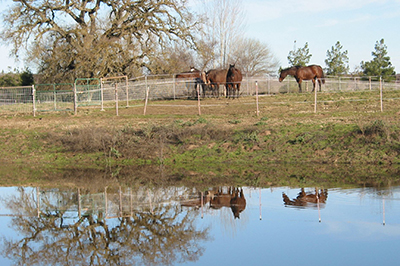 This supports native grasses, healthy cattle, and increased water retention in the soil. Chet has also fenced off riparian corridors and livestock ponds as special management zones that receive short-duration grazing so that native plants can thrive and provide abundant nesting habitat for birds and other wildlife, including, among others, tricolored blackbirds, box turtles, California quail, and black-tail deer.
This supports native grasses, healthy cattle, and increased water retention in the soil. Chet has also fenced off riparian corridors and livestock ponds as special management zones that receive short-duration grazing so that native plants can thrive and provide abundant nesting habitat for birds and other wildlife, including, among others, tricolored blackbirds, box turtles, California quail, and black-tail deer.
“Chet Vogt has dedicated himself to innovation in environmentally beneficial ranching practices for three decades,” said A.G. Kawamura, Secretary, California Department of Food & Agriculture and a judge for the Leopold Conservation Award. “He demonstrates the natural compatibility between raising cattle and caring for the land, and he inspires all ranchers and farmers to work from that understanding.”
Chet is widely respected for bridging the gap between cattle ranchers and environmental advocates, forging effective partnerships and cultivating productive, ongoing communication. He frequently hosts workshops and field trips on Three Creeks Ranch to educate ranchers, regulators, and environmental scientists about his practices. He has held numerous community leadership positions and currently serves California Cattlemen’s Association as the Rangeland Improvement Committee Chairman. Chet is actively involved with the California Rangeland Conservation Coalition, which encompasses nearly 100 agricultural, environmental, and government organizations.
“Chet is a quintessential western rancher –stout, serious, and rugged,” wrote Dr. Steve Zack, Wildlife Conservation Society, in his letter of recommendation. “Yet, he is also a leader of new ways to manage the land, and his efforts have inspired me and many others concerned with natural resource management in the western United States.”
 Sign In
Sign In
 Sign In
Sign In
